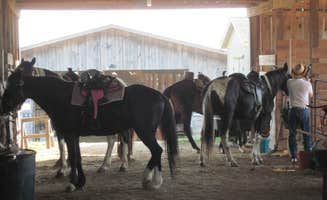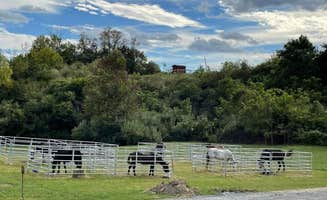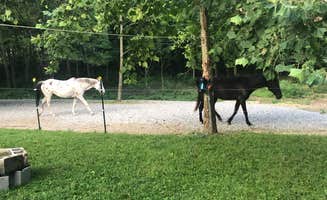Horse camping opportunities near Williamsburg, Kentucky offer direct access to trail systems within the Daniel Boone National Forest and Big South Fork National River and Recreation Area. The Cumberland Plateau terrain features sandstone cliffs, wooded valleys, and river access with elevation changes ranging from 700 to 1,750 feet. Most equestrian campsites remain open from April through October with limited winter availability at select locations.
What to do
Trail riding from camp: Little Lick Campground offers immediate access to the Nathan McClure trailhead directly from the campground. "You will drive and drive and drive...and drive on the gravel road. However the road is good and the signage will get you there! Follow the little tent signs to Little Lick Horse Camp in the woods of Daniel Boone NF," notes camper Shelly S. The trails accommodate horses, llamas, trail bikes and dogs with enough space for multiple tent setups.
Swimming and fishing: Riverside camping at Clayton Geneva Memorial Campground provides water recreation options. "You can fish off the banks of the Cumberland river or take a swim. Close to trails and a waterpark too," shares Jennifer L. The campground features sandy riverfront tent sites with access points for canoes and kayaks.
Hiking nearby: Wooded areas surrounding horse camps connect to extensive trail networks. "Plenty of hiking in the surrounding area" at Bandy Creek Campground, according to Carissa D. The recreation area offers varied terrain for day hikes ranging from 2-10 miles with difficulty levels from easy to strenuous.
What campers like
Spacious sites: Equestrian campgrounds provide ample room for trailers and equipment. "The sites are big enough for more then one tent or hammock" at Little Lick Horse Camp, according to reviewers. Similarly, Great Meadows Campground offers "great grassy area to set up a tent" with "nice space around the sites and some seclusion due to the forest," as Sara S. notes.
Dark skies: The remote location of many horse campgrounds creates excellent stargazing conditions. "Dark and starry skies, quiet and woodsy," reports Shelly S. about Little Lick Horse Camp. Another camper at Bandy Creek mentions it serves as an "entrance into dark sky zone" where they "got wonderful night sky shots."
River access: Water features enhance many camping locations. Clayton Geneva provides "sanded, river front tent sites. The camp sites are also shaded, very comfortable even in July," according to Amber H. Similarly, Great Meadows has sites "along a stream on Racoon side" with good fishing opportunities.
What you should know
Primitive facilities: Most equestrian campgrounds offer basic amenities. Little Lick Horse Camp "is primitive, to include no toilet so bring your bucket or whatever you use.....remember Leave No Trace," advises Shelly S. Be prepared for limited or no cell service, especially at Great Meadows where one reviewer notes "no cell phone service but it does have clean toilets."
Weather considerations: Barren Fork Horse Camp can get "hot with no electric hookups," according to Chris F. Similarly, some areas become unusable after rain - "Only 2 of the 6 sites are usable if it has rained within a week of your stay," warns Kayla L. about one location.
Road conditions: Access roads to horse camps often require careful driving. "Make sure you have the horse power for the hills going out. I had to back down the gravel hill and get a second run to make it up!" reports Shelly S. about one campground. Little Lick's remote location means "you will drive and drive and drive...and drive on the gravel road."
Tips for camping with families
Look for campgrounds with amenities: True West Campground & Stables offers "an outdoor grill on a patio that was free for guests to use" and "bathrooms were well attended to also. Cleaned regularly and well stocked," according to Jovee S. These facilities make family camping more comfortable.
Consider site accessibility: Some locations work better for younger children than others. One camper noted Bandy Creek "wasn't the best place for toddlers" because "most of the trails are much longer than 2 miles, so there wasn't much to do with our two toddlers." Check trail lengths before bringing small children.
Pack for wildlife encounters: Be prepared for native wildlife. One camper at Great Meadows "got surprised by a bear while gathering firewood nearby," while another at Little Lick advises to "be wary of shy bears and bobcats." Store food properly and teach children appropriate behavior.
Tips from RVers
Check hookup availability: Electrical access varies across campgrounds. Barren Fork Horse Camp has "no electric hookups at $12 a night" while other horse campgrounds like Bear Creek provide 30-amp service at each site. Confirm your power needs before booking.
Site dimensions matter: "The sites were a bit short and we couldn't park our tow vehicle in front of our 17' camper. So large campers beware," notes Chelsea D. about Bandy Creek. Verify your total vehicle length against site specifications.
Prepare for hills: The Cumberland Plateau terrain creates driving challenges. "Make sure you have the horse power for the hills," advises one camper. Another mentions limited "parking spots near the shower house" requiring planning for access to facilities.




